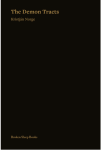
A compelling mix of mythology, delirium, fairy story and poetry, The Demon Tracts presents a facsimile of ‘Norwegian-Shetlandic modernist poet’ Kristjá Norge’s ‘loggbook’ alongside transcribed and typeset versions of his texts by Scottish musician and poet MacGillviray.
By 1961 Norge was self-exiled to a Scottish Island, an abandoned ‘Hebridean death station’, with only himself for company. Here he documented the phases of the moon, wrote his poetic masterpiece Ravage (published in 2023 by Bloodaxe) and wrestled with the ‘Sluagh nam Marbh’, ‘a malevolent wind of voices’ which transported him into the realms of madness, possession and poetry.
The poems are often abstract elegies to insanity, with Artaud-ian invocation sharing the page with diaristic observations and self-analysis. Compare the inanities of ‘Found tinned tomatoes in the cupboard / ate with black porridge (no milk, no sugar)’ (22nd September) to the bleak ‘Broken’ that constitutes the complete text of ’14th Oct’ or the gnostic musings of ‘Judicial System’:
Perhaps Christ was a demon:
he could work through the
power of suggestion : he
could perform diabolical acts :
he was stronger than the devil :
be committed public suicide : god
his father, forgot him.
He
carried the wound of
self_knowledge. He carried
blood in his teeth.
He was a poet. Perhaps Christ
too, was a demon.
Demon here is a term to do with spirit, not hell and bedevilment. Norge was convinced he was possessed, indeed had become other. ‘I charge the body language of dust / I charge the schism of magical anatomy’ he declaims, also noting later in the same poem (‘Inspoken Verse’) that ‘I add to the nest of knowledge’.
Throughout the book, even its most lucid and mundane moments, Norge is aware that his destiny is to disappear, to be transported elsewhere, and that what he writes is ‘All backward glances’, a product of ‘the way a dream is recollected / and shapes the memory it /contains’ (‘SONG OF ASH/ Ashen Song’). It is unclear whether Norge embraces his own transformation or not. The reliance on the lunar calendar and his obsession with particular images – an Egyptian temple, heretical graffiti, wolves and lions, all scrapbooked into his loggbook – suggest the former; but elsewhere the ghostly images in his dull steel mirror and the windborne voices are a sufferance to be endured.
At ‘FULL MOON 27th JULY, 1961’ Norge is hallucinating. Not only can he hear the whispers of the wind but he can see his own body washed up by the sea, leading to a vision of ancestral fire, corpse parades, fetid breath and ancient knowledge which drives him back to his bed ‘like a drunk’, praying that ‘God and all his risen angels / help me tonight’. By October, in ‘FULL MOON 23RD 1961’, Norge notes that it is ‘dark / in this windblown glass of death’ with ‘all the songs of the travailer camps blown / into me on a hot stem of molten glass’. He is, ends the poem, ‘shattered’.
The book closes with the fragmentary long poem the book is named after, written it seems on the 11th December 1961, shortly before Norge disappears, perhaps to heaven or hell, perhaps to become part of the wind’s poetic chorus, maybe an imaginary poet eclipsed by the legacy of actual others. In 83 brief segments ‘The Demon Tracts’ invoke, reimagine, summarise and regenerate what has gone before. It is an alchemical condensation, a shamanic journey into being, a final embrace of essential being.
If ‘The Demon Tracts’ itself is reminiscent of Ted Hughes’ Gaudete poems, elsewhere MacGillviray keeps company with Iain Sinclair and his network of writers, film-makers and psychogeographers, academia and Scottish mythology and folk music, whilst also revering the poetic intentions and posturing of singer Jim Morrison. She knows the power of storytelling, ritual and ventriloquized spirits and magic, knows how songs and words can be disrupted, used and reimagined, to facilitate and create both confusion and enlightenment. As Norge writes, ‘Here, knowledge has begun.’
Rupert Loydell 24th May 2024

